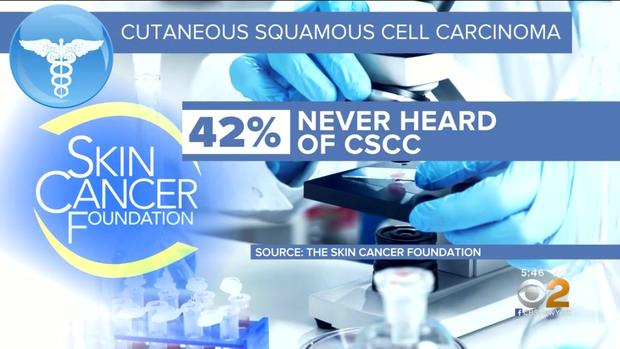Medical Professionals Sounding Alarm About Lesser-Known CSCC Skin Cancer
NEW YORK (CBSNewYork) -- It's the second-most common cancer in the U.S., yet you've probably never heard of it.
It's a kind of skin cancer called squamous cell and there are a million cases of it every year.
And as CBS2's Dr. Max Gomez reported Wednesday, it's different than other skin cancers.
There are three main types of skin cancer. There's basal cell, by far the most common. There's melanoma, far fewer cases but deadly because it spreads when it's very small. Then there's squamous cell, also called CSCC. It falls in between melanoma and basal cell in terms of severity.
MORE: Chemical Sunscreens Help Prevent Skin Cancer, But What Else Do They Do To A Body?
Ed Matthews spent many of his younger years working as a caddie on the golf course.
"Five-six days a week I would do that, so I was definitely in the sun then," Matthews said.
Little did he know all of that sun exposure would lead to problems later.
Dr. Ariel Ostad has treated Matthews for various skin cancers. Ed said his biggest scare came when he noticed a small bump on his neck.
"Then it became from a pea to the size of a bean and then it blew up to a half of a golf ball," Matthews said.
He was diagnosed with advanced cutaneous squamous cell carcinoma, or CSCC.
"As it grows it can become scaly, red, inflamed. Ultimately, it can be become painful as it gets bigger," Dr. Ostad said.
MORE: 'Dermatoscope' Can Identify Skin Cancer Without Scarring Biopsy
The Skin Cancer Foundation is raising awareness about this type of skin cancer. A new survey shows 42 percent of Americans have never heard of CSCC, even though it causes more deaths than melanoma. That's because there are so many more cases of CSCC than melanoma.
Matthews is among the 40,000 people treated for advanced CSCC every year.
"He underwent not only surgery to remove that mass on his neck, but all the lymph nodes had to be removed," Dr. Ostad said.
He also needed radiation and chemotherapy.
Dr. Ostad said early detection is critical, so he encourages annual skin exams and prevention from an early age, including stressing sunscreen and protective clothing. Now, Matthews checks his body for any skin changes.
"When I'm shaving I'm looking around a little bit or feeling it," Matthews said.
He has been in remission for three years.
All three types of skin cancer are related to sun exposure. The folks who are most at risk are fair skinned, with blonde hair and blue- or light-colored eyes. However, African Americans can also get skin cancer, so everyone needs to wear sunscreen.




